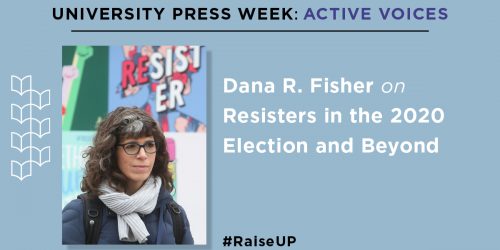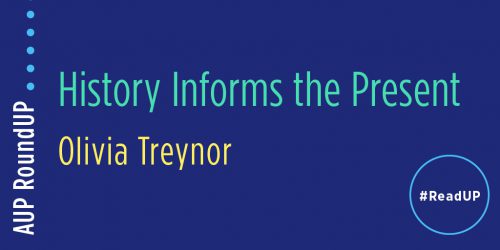University Press Roundup

Welcome to our weekly roundup of the best articles from the blogs of academic publishers! As always, if you particularly enjoy something or think that we missed an important post, please let us know in the comments. (And look back at our University Press Roundup Manifesto to see why we do this post every Friday.)
This week, Yale University Press’s Yale Books Unbound blog shared an excerpt from Revolutions without Borders: The Call to Liberty in the Atlantic World by Janet Polasky that highlights printed news’ surge in popularity during the French and American revolutions. Her book, which focuses on the international revolutionary exchange of ideas between 1776 and 1804 across the Atlantic ocean, explains that before the revolutions, newspapers were primarily read by individually wealthy people, and that European politics had generally only been the business of expensive international gazettes. However, circulation exploded during the revolutions, expanding revolutionary discussions and political debate from small pamphlets into the broader realm of printed newspapers.
Princeton University Press’ blog recently discussed Jason Brennan’s new book Against Democracy, which argues against the popular idea that democracy promotes equality and empowers its citizens to be more informed. In the book, Brennan explains that in a democratic society, people differ in many ways regarding what their beliefs are, how they share their beliefs, and how likely their beliefs are to be changed based on how objectively they think about social science and philosophy. According to Brennan, there are three types of democratic archetypes- hobbits, hooligans, and vulcans. Hobbits are “mostly ignorant and apathetic about politics, lack strong, fixed political opinions, and are ignorant of current events and the social science used to evaluate those events” or, according to Brennan, the typical non-voter in the US. Hooligans “possess strong and fixed opinions, are able to present arguments for their beliefs, consume political information in a biased manner, and ignore evidence that does not confirm their preexisting opinions,” which describes typical voters, registered party members, and politicians in the US. Lastly, Vulcans “think scientifically and rationally about politics”, their opinions are “grounded in social science and philosophy,” and they are “able to defend opposing points of view,” which describes a minority of people in the US. but is what supposedly democracy aims for. Thus, democracy is not working.
Johns Hopkins University press’ blog continues its Unexpected Democracy blog series with a post about shaping public opinion during the first World War. One week after the US declared war on Germany and Austria-Hungary, President Woodrow Wilson created the Committee on Public Information (CPI). Under the direction of George Creel, this agency aimed to create favor for the war effort by saturating Americans from April 1917 to the end of the war in November 1918 with a deluge of leaflets, pamphlets, news bulletins, schoolroom materials, and films, in “every available medium, including the printed word, the spoken word, the motion picture, the telegraph, the cable, the wireless, the poster, the sign board.” The most significant effort of this period was the “Four Minute Men” campaign, which aimed to utilize strong speakers in communities across the country towards persuading people to support the war. These speakers would enter movie theater during intermission for four minutes, the time it took to change a film reel, to present a patriotic speech and “drum up support for the war effort.” This period of history is an interesting window into how the US government has the capacity to deliberately manipulate the way citizens think, believe, and feel.
Recently, University of North Carolina Press’ blog shared an excerpt from Us Versus Them: The United States, Radical Islam, and the Rise of the Green Threat by Douglass Little. In this important analysis of America’s persistent perception of the ominous “other”, Little explores the shift that led US policy makers to move focus over from the “Red Threat” of international communism to battling the “Green Threat” of radical Islam after the overthrow of the Shah of Iran in 1979. This shift in the “us versus them” mentality that has historically pitted the US against “Native Americans, Mexicans, Asian immigrants, Nazis, and the Soviets” comes from the pervasive “City on a Hill” mentality that American policy has always maintained.
When Christopher Yanov was a substitute teacher at a middle school with a student body that spoke twelve different languages and “gang wannabe’s ruled the courtyard”, he saw that many of the students had the same determination and inherent intelligence and ability as many of the middle-class kids he had grown up with. The only roadblock for them to go on to earn college degrees was the family and social support that middle class students take for granted, an ambitious vision of what they are truly able to accomplish, and a community of peers and adults who help them reach their goals. In a guest post on University of California Press’ blog, Yanov discusses his new book Grit and Hope: A Year with Five Latino Students and the Program that Helped Them Aim for College
, which tells the stories of five Latino students in his Reality Changers program, a college readiness program which aims to support disadvantaged youth in San Diego.
On Stanford University Press’ blog, Renee Ann Cramer, author of Pregnant with the Stars: Watching and Wanting the Celebrity Baby Bump , discusses Chimamanda Ngozi Adichie’s pregnancy as an act of feminist resistance. As Cramer has observed, “Women, especially women in the public eye, are expected to perform pregnancy and motherhood while men do not have the same demands placed on them to perform their fatherhood. Men are celebrated for their moments of paternal work; women are simply told they are doing as expected-or, where they deviate from expectations, are criticized.” It is expected to publicaly display your pregnancy, because women must conform to their function in the public eye. By refusing to be public in her pregnancy, Chimamanda Ngozi Adichie, author of Americanah and We Should All Be Feminists, is making a feminist statement that actively confronts unfair gender expectations by staying out of the public eye.
What does suicide have to do with the first amendment right to free speech? Can a college student be disciplined for sending text messages suggesting that another student commit suicide? Can a young women be prosecuted for repeatedly texting her boyfriend, insisting that he commit suicide? Susan Steffan, author of Rational Suicide, Irrational Laws: Examining Current Approaches to Suicide in Policy and Law, asks these questions, and more, in a blog post on Oxford University Press’ blog.
Thanks for reading! As always, we hope that you enjoyed the links. Please let us know what you think in the comments!



